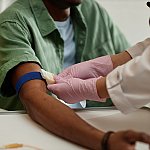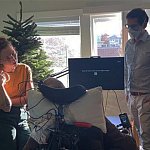You are here
December 18, 2024
2024 NIH Research Highlights - Human Health Advances
Disease Prevention, Diagnosis, and Treatment
With NIH support, scientists across the United States and around the world conduct wide-ranging research to discover ways to meet the NIH mission to enhance health, lengthen life, and reduce illness and disability. Groundbreaking NIH-funded research often receives top scientific honors. In 2024, these honors included three NIH-supported scientists who received Nobel Prizes. Here’s just a small sample of the NIH-supported research accomplishments in 2024. Also see this year's Promising Medical Findings and Basic Research Insights.





